
Collecting Baseball Card Oddities, Part 1: Food Issues
Oddballs are the ungraceful, catch-all name for a group of baseball cards that includes those issued from food manufacturers (Kellogg's Post, Hostess), retailers (such as Toys R Us, Kay-Bee and K-Mart), and premium or test issues by Topps and others companies. With many of the having limited, regional distribution, these cards offer plenty of chase opportunities for player and team collectors.
Before Major League Baseball Properties and the Player's Association saw the multimillion dollar licensing potential in baseball cards as their own revenue stream, the league was all too happy for the “free" publicity and exposure for its game in the 70s and 80s. While the issuing of cards characterized as oddball are not strictly limited to those decades, this was the heyday for this niche as so many companies in the United States had an interest in tying their brand to America's pastime. This three-part article will look at the most common oddball releases: food issues, retail issues, and test issues/premiums and micro releases.
Oddball Cards: Food Issues
Some of the most easily recognizable oddball cards are the food issues made famous by the likes of Kellogg's and Hostess in the 70's. The Hostess panels in particular were a favorite with kids because the cards were printed on the side or bottom panels of the packaging and you could easily see who you were getting.
Kellogg's
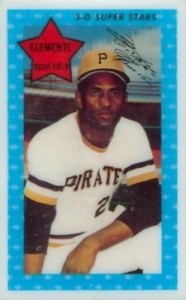
Kellogg's, the Battle Creek, Michigan company who invented Corn Flakes, began using baseball cards in 1970. The set consists of 75 cards that measure, about 2 1/4" x 3 1/2", or just narrower in width than a standard card. The plastic-covered cards were made to have a 3D effect. They were distributed individually in specially marked boxes of Kellogg's cereal, and sold direct via mail-in, in packs of six cards. Key cards on the checklist include Pete Rose, Willie Mays, Roberto Clemente, Ernie Banks, Frank Robinson, Johnny Bench, Tom Seaver, Reggie Jackson and Brooks Robinson. Kellogg's continued to produce card sets for 14 straight years through 1983. The sets ranged in size from 54-cards to 75-cards. In 1972, a second series was issued honoring baseball's All-Time Greats. That set consisted of 15 total cards and includes the likes of Babe Ruth, Lou Gehrig, Walter Johnson, Honus Wagner, Ty Cobb, and Cy Young to name a few. The durability of the card stock used on all the Kellogg's cards has made them extremely resilient and their conditioning has held up well over time. The biggest issue has been from the plastic in the cards cracking, which is easily noticeable.
Post
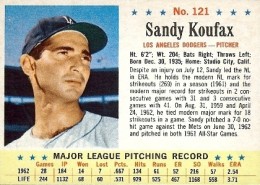
Post Cereal, however, was the first mainstream cereal company after World War II to distribute baseball cards direct in their product. Dating back to their first release in 1960, which was a test release of just five cards (Don Drysdale, Al Kaline, Harmon Killebrew, Ed Mathews, Mickey Mantle and Roger Maris). It proved so successful that the company expanded the offering the following year. To this day, the 1961 set remains one of the largest food issues ever produced with a total of 200 cards. Post continued issuing sets for another few years until doing so became cost prohibitive to the company's bottom line. However, they briefly returned to the market, as did Kellogg's in the early 90s when once again, everyone it seemed was producing baseball cards.
Hostess
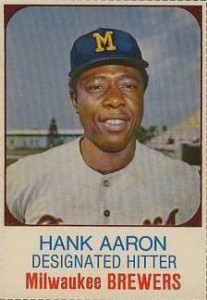
Starting in 1975, the Hostess Company, maker of Twinkies, Ding Dongs, and other baked confectionary treats started printing baseball cards on their packaging. The inaugural set also contained some of the league's biggest stars including Nolan Ryan, Reggie Jackson, Carl Yastrzemski, Rod Carew, Steve Carlton, Tom Seaver, Willie Stargell and Mike Schmidt, to name a few. These cards contained a full color portrait of the player, in uniform, on the front and complete statistics on the back. Hostess continued to produce annual released through 1979 and included large sets of 150 cards, each depicting a different player. The company intermittently used this marketing gimmick in later years but not to the degree or fan appreciation of the mid- and late-70s releases.
Burger King
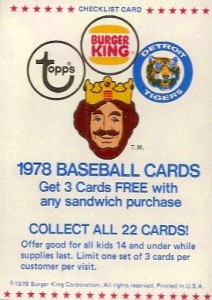
In 1977, Burger King began a ten-year run of issuing baseball cards through various promotions. The company's first foray into the trading card market actually started back in 1972 with football cards on the ice milk cup lids. The initial years of Burger King cards were focused on team sets and regional distribution that included the Yankees, Phillies, Rangers, and Astros. In later years, the card sets grew from 23 to 34 cards as other players from around the league were added to the checklist. If the Burger King cards look familiar, that's because they were made in partnership with Topps and shared the same base design.
Other Tasty Oddball Cards
The list of food manufacturers and brands that have used baseball cards in their marketing is exhaustive. In addition to the ones detailed above, some of the other popular companies from the 70s and 80s are listed below. However, it certainly warrants mentioning that early adopters of this marketing concept goes as far back as 1958 with Hires Root Beer as well as others.
1958: Hires Root Beer
1959-1971: Bazooka
1960-1962: Bell Potato Chips
1965: Kahn's
1976: Dairy Isle, Chilly Willee, Crane, Isaly's
1977: Pepsi
1978: Papa Gino's
1981-1988: Drake's
1981: Coke, Squirt
1982: Cracker Jack, Granny Goose, Squirt, Red Lobster
1984, 1987: Ralston-Purina, Nestle, 7-11 Slurpee
1985: Fun Foods
1986: Meadow Gold Milk
1987: Hygrade, Kraft, Leaf Candy, M&M, 7-11 Slurpee, Weis Weiners, Jiffy Pop
1988: Nestle, Chef Boyardee, Weis Weiners, Jiffy Pop
1989: Cap'n Crunch, Hills
By the start of the 1990s, the production of baseball cards reached a fever pitch, which is commonly referred to now as the “junk wax" era. The long-held monopoly by Topps had been over since 1981 and now it seemed almost everybody was producing baseball cards. Food companies weren't exempt. Having been some of the first brands to align themselves with baseball, they weren't about to miss out on another opportunity to capitalize on the exposure. Below is a list of food companies who had popular issues in the 1990s. While not valuable, these sets often have many of the game's superstars and should be considered must-haves for player collectors.
1990: Bazooka, Jumbo Sunflower, Mother's Cookies, Long John Silver's, Wonder Bread
1991: Denny's, Jumbo Sunflower, Jimmy Dean, Kellogg's, Mootown Snackers, Mother's Cookies, Hosum Bread
1992: Denny's, Diet Pepsi, Jimmy Dean, Kellogg's, McDonald's, Mootown Snackers, 7-11 Slurpee
1993: Denny's, Hostess, Jimmy Dean, McDonald's, Mother's Cookies
1994: Church's, Denny's, Kraft, Mother's Cookies, Tombstone Pizza
Surprising, as it may seem, the above list represents only a fraction of the food issues released. Collectors that decide to pursue this niche are encouraged to do more research, as many food brands were limited in distribution by region and time.
A fantastic resource for oddball baseball card collectors is the 2011 Standard Catalog of Baseball Cards
by Bob Lemke. It's an exhaustive book with checklists and information on almost every food issue set released.
Continue to Part 2: Retail Issues.
If you have a favorite set, question or additional set we didn't mention, be sure to let us know in the comments section below.
 | Making purchases through affiliate links can earn the site a commission |
































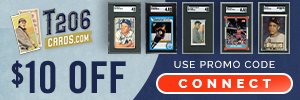
Joe
After 30 yearsof collecting, baseball,football,Nascar